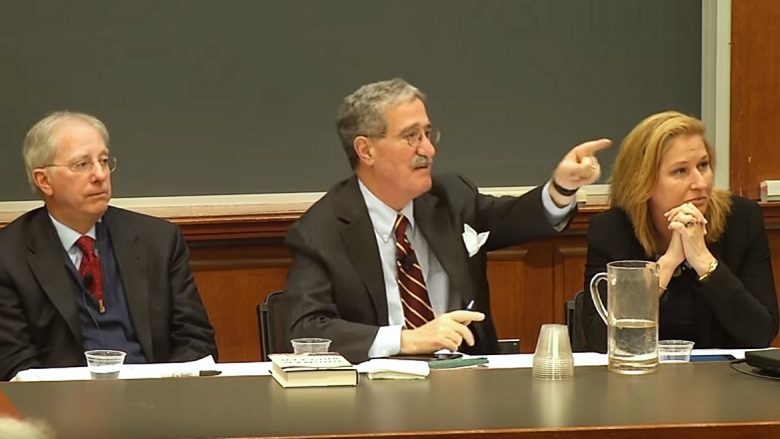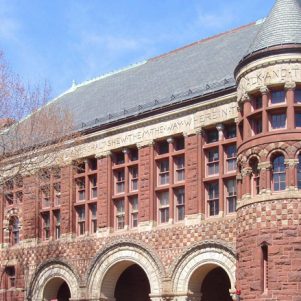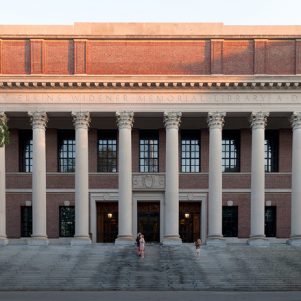Harvard Law student’s anti-Semitic remark sparks uproar
By Evan Lips | April 21, 2016, 18:48 EDT
 In this since-deleted frame, moderator Professor Robert Mnookin, center, calls on a student who asked Israeli lawmaker Tzipi Livni, right, why she was “so smelly” at a Harvard Law School forum last week. Livni was there to discuss the Israeli-Palestinian conflict with former Diplomat David Ross, left. (Image courtesy of YouTube.com)
In this since-deleted frame, moderator Professor Robert Mnookin, center, calls on a student who asked Israeli lawmaker Tzipi Livni, right, why she was “so smelly” at a Harvard Law School forum last week. Livni was there to discuss the Israeli-Palestinian conflict with former Diplomat David Ross, left. (Image courtesy of YouTube.com) CAMBRIDGE – A Harvard Law School student, who mocked a former Israeli foreign minister with what has been denounced as an anti-Semitic remark during a question-and-answer session after a school forum last week, believes the matter has been “blown out of proportion,” a person close to the situation said Thursday.
The person said the student, Husam el-Coulaq, who leads the school’s Students for Justice in Palestine chapter, didn’t want his name to be made public after asking a forum speaker why she was “smelly.”
Reached via his cell phone by the NewBostonPost, el-Coulaq refused to comment on the record. His name also appears as el-Qoulaq and el-Qoolaq, apparently to aid its English pronunciation.
In the Q&A session, el-Coulaq asked Tzipi Livni, a former Israeli foreign minister and a current member of the embattled nation’s parliament, “How is it that you are so smelly?”
He asked the question surrounded by fellow law school students at the event, sponsored by the Harvard Law School Program on Negotiations. He subsequently offered a written apology, claiming he wasn’t aware of the anti-Semitic nature of the remark. A recording of the forum has been edited to cut out the offensive query and his name has been removed from a transcript of the event.
The incident was first reported by the Harvard Law Record, which also withheld el-Coulaq’s name. The publication’s editor-in-chief said Thursday that the name was left out at the request of the Harvard Jewish Law Students Association. In an op-ed article in the Record that appeared Monday, three members of that association pointed out the historical anti-Semitic nature of the remark.
The Record’s editor, Michael Shammas, recalled Thursday that the writers, Jeremy Salinger, Jon Gartner and Jacqueline Wolpe, received the student’s apology and a request to publish it in the Record. But el-Coulaq asked to have his name withheld. The writers agreed to the request.
“The Record didn’t make that decision – it was made by the three students who wrote the opinion piece,” Shammas said, adding that school administrators likewise “didn’t have a hand” in the matter. The Record isn’t supported by the law school or the university.
The transcript of last Thursday’s incident shows the following:
At Harvard, law student asked Tzipi Livni why she was a “smelly” Jew. @harvard_law won’t release video. Transcript: pic.twitter.com/O9fMNY8nHG
— Yair Rosenberg (@Yair_Rosenberg) April 19, 2016
The group that hosted Livni, a member of Israel’s Zionist Union Party, traditionally posts videos from its forums on YouTube. In the recording of last week’s event, posted Wednesday, el-Coulaq’s “smelly” question was cut from the 90-minute clip:
The event, billed as a talk on negotiation lessons from the Israeli-Palestinian conflict and the possibilities of reaching more agreements, involved a discussion between Livni and Dennis Ross, a former American diplomat, moderated by Harvard Law Professor Robert Mnookin, who directs the school’s negotiation program.
Mnookin didn’t respond to a request for comment on why the exchange between el-Coulaq and Livni was missing from the recording while the transcript of the discussion included the exchange but not el-Coulaq’s name.
Shammas’s comments regarding the Record’s decision to withhold el-Coulaq’s name come as coverage of the incident has increased, beginning with reports published by sites such as TabletMag.com and the Jerusalem Post. On Thursday, reports also appeared in the Boston Globe and the Washington Times.
Increasing coverage, Shammas said, has led to calls for the school and the Record to identify the questioner.
In the printed apology, the student wrote that he was “entirely unaware” of the anti-Semitic connotations people attached to his remark. In their op-ed, the three students wrote:
“A quick Internet search will show that the stereotype of ‘the Jew’ as ‘smelly’ or ‘dirty’ has been around since at least the 1800s. The Nazis promoted the idea that Jews ‘smell’ to propagandize Jews as an inferior people.”
In the apology, the student said: “I want to be very clear that it was never my intention to invoke a hateful stereotype, but I recognize now that, regardless of my intention, words have power, and it troubles me deeply to know that I have caused some members of the Jewish community such pain with my words,” he wrote. “To those people I say, please reach out.”
“Give me an opportunity to make it right,” the student said, leaving unexplained how anyone could do that without knowing who the student was.
Shammas defended his decision to withhold the student’s identity.
“I’m not sure what decision I would have made if JLSA wanted to include his name,” Shammas said, referring to the Jewish student group. “All of that – combined with being the newspaper that covers a law school community – makes me think that we’re a little different than newspapers in general.”
“I don’t even know if including his name was crucial to the story,” he added.
Following Monday’s op-ed publication, Harvard Law School Dean Martha Minow discussed the incident in an email to the school community Tuesday, calling it an “ad-hominem attack” that was “offensive.”
“Many perceive it as anti-Semitic, and no one would see it as appropriate,” Minow added. She also didn’t name the student or mention why he hasn’t been identified.
Shammas said he and others at the Record have spent time monitoring the website’s comment section to spot and delete anything that identifies the student.
In 2010, a similar situation arose at the law school that involved a friendly email exchange about racial issues between law students. According to a report in the Crimson, Harvard’s campus daily newspaper, a female law student wrote:
“Everyone wants someone to take 100 white infants and 100 African-American ones and raise them in Disney utopia and prove once and for all that we are all equal on every dimension,” the student said, according to the Crimson.
“I am merely not 100% convinced that this is the case,” the student said.
Months later, a copy of the email was forwarded to the Black Law Students Association and later went viral, drawing national attention. The student’s identity quickly appeared in various news reports, the Crimson said, although a large percentage of students noted that the exchange was originally private.
“The student assumed the risk of her email being widely circulated as soon as she sent it to multiple people,” Harvard Law Professor Ronald L. Sullivan told the Crimson at the time.
Regarding last week’s incident: el-Coulaq, however, made his remark in what amounted to a filmed, public forum.
The latest incident also comes weeks after former Harvard University President Lawrence H. Summers, who currently teaches economics at the school, penned an op-ed article for the New York Post in which he said that a “vast double standard” exists on American campuses in which anti-Semitism is tolerated.
“It has seemed to me that a vast double standard regarding what constitutes prejudice exists on American college campuses,” he wrote. “There is hypersensitivity to prejudice against most minority groups but what might be called hyper-insensitivity to anti-Semitism.”











